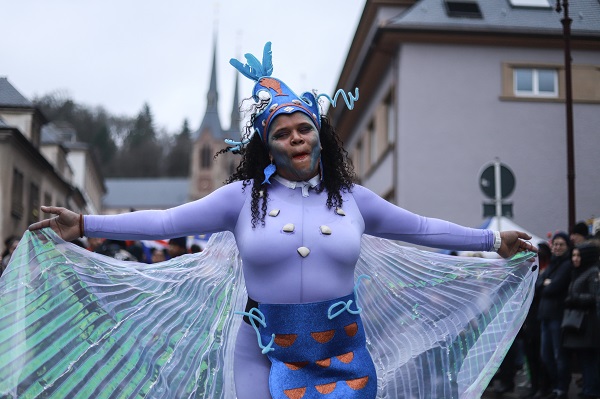 Cavalcade in Diekirch, February 2020;
Credit: Ali Sahib
Cavalcade in Diekirch, February 2020;
Credit: Ali Sahib
The Carnival (Fuesent) season officially takes place between Candlemas (Liichtmëssdag) on 2 February and Ash Wednesday (Äschermëttwoch), which this year falls on 14 February; schools in Luxembourg are currently off for the Carnival holidays (Saturday 10 to Sunday 18 February 2024 for most schools).
Carnival in Luxembourg is a vibrant and beloved tradition celebrated from February to March, with varying dates depending on the year. The festivities officially kick off with Liichtmëssdag and culminate with Mardi Gras, which will fall on Tuesday 13 February in 2024 - although celebrations often continue in the following weeks. The term "Carnival" is thought to originate from the Italian word "carnelevare", meaning "removing the meat", and symbolising the beginning of the fasting period leading up to Easter.
During Carnival, Luxembourgers enjoy traditional sweets such as "Fuesendkichelcher", knotted doughnuts made from leavened dough and decorated with powdered sugar, along with other treats such as "Nun’s Puffs" (Pets-de-nonne), fried choux pastry sprinkled with icing sugar.
During the festive season, people in Luxembourg go to masked balls held throughout towns and villages. The Cavalcade of Diekirch, dating back to 1870, is a notable example, attracting thousands of guests each year. This year's cavalcade on Sunday 11 February 2024 (Fuessonndeg) promises an array of entertainment, including DJs, prizes for the best costumes and an array of treats distributed along the route. The procession will start at 14:30. The organisers expect around 25,000 guests this year. One day earlier, the town is hosting a "Kannerfuesbal" for children.
Moreover, Esch-sur-Alzette will once again be hosting its popular "Kannerfuesbal" (children’s masked ball) on Saturday 24 February this year, starting at 14:00. This is an occasion for children and families to come together to revel in the celebrations, but other parties and festivities are being organised from Friday 23 to Sunday 25 February 2024 throughout the city centre.
These so-called cavalcades represent a significant highlight of Carnival in Luxembourg. They are joyful processions featuring ornate floats and walking groups parading through major cities.
Other notable cavalcades include those in Wasserbillig and Remich, both offering their own twist on the tradition - and taking place a few weeks after the official end of Carnival. In Wasserbillig, the "Nuetscavalcade" will take place on the evening of Friday 9 March 2024, from 18:11 (eleven being a special Carnival number, particularly in Germany). This year's night parade will feature about 50 different, colourful carnival groups, artfully illuminated floats and tractors, and will start on the banks of the Moselle river, moving slowly towards the centre, where a dance event is taking place afterwards, from 21:00.
Meanwhile, the Remich Cavalcade is set to take place on Sunday 10 March 2024 from 14:30 (the end of a festive weekend in the wine-growing town). This comes almost one month after the burning of the "Stréifrächen" (straw woman - normally a straw man or "Stréimännchen" but 2024 is a leap year) on Ash Wednesday (same date as Valentine's Day this year) - the official "end" of the Carnival season.
Pétange is also hosting its large-scale cavalcade on Sunday 10 March 2024, starting at 14:11.
The origin of the cavalcades dates back to ancient times - they used to be linked to religious and agricultural celebrations. Carnival in Luxembourg is now a time of joy, camaraderie, and cultural festivity, bringing communities and different generations together to embrace the tradition's cheerfulness. It is a time when everything is temporarily "turned upside down".








